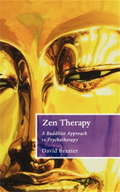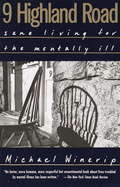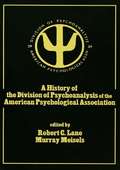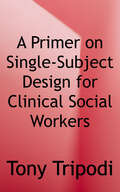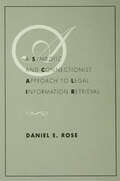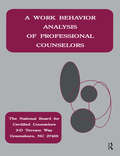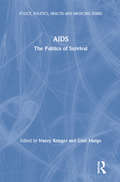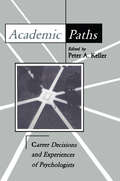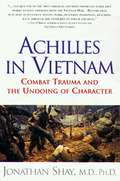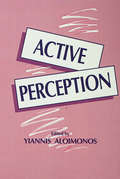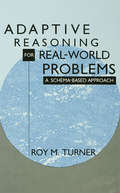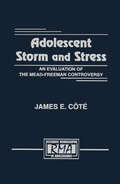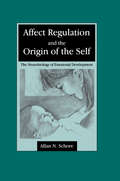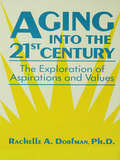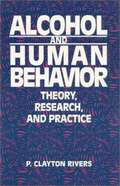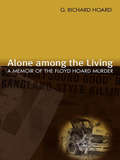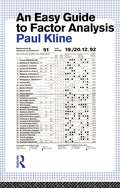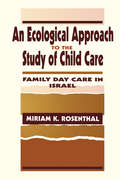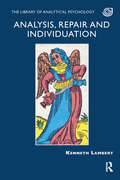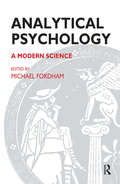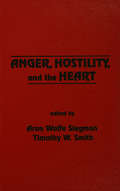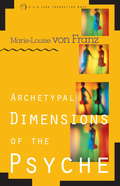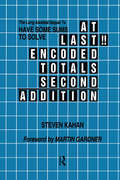- Table View
- List View
Zen Therapy: A Buddhist approach to psychotherapy
by David BrazierBuddhism, from Abhidharma to Zen, offers a practical path to harmony of head and heart. For over 2,000 years Buddhists have been developing sophisticated psychologies to guide the work of achieving freedom from mental suffering. Now East and West are beginning to learn from each other. In a readable and practical manner, this book challenges basic assumptions of Western psychology, demystifies Buddhist psychology and presents Zen as a therapy. Giving examples of its effectiveness in psychotherapeutic practice, the author shows how Zen derives from the Buddhist theory of the mind and throws new light upon the Buddhist theory of relations and conditions. This seminal wok is a resource full of intriguing and controversial ideas.
Zen Therapy: A Buddhist approach to psychotherapy
by David BrazierBuddhism, from Abhidharma to Zen, offers a practical path to harmony of head and heart. For over 2,000 years Buddhists have been developing sophisticated psychologies to guide the work of achieving freedom from mental suffering. Now East and West are beginning to learn from each other. In a readable and practical manner, this book challenges basic assumptions of Western psychology, demystifies Buddhist psychology and presents Zen as a therapy. Giving examples of its effectiveness in psychotherapeutic practice, the author shows how Zen derives from the Buddhist theory of the mind and throws new light upon the Buddhist theory of relations and conditions. This seminal wok is a resource full of intriguing and controversial ideas.
9 Highland Road
by Michael WineripBefore Julie Callahan came to the house at 9 Highland Road in Glen Cove, New York, she had spent a good part of her young life in mental hospitals, her mental and emotional coherence nearly destroyed by a childhood of sexual abuse. Fred Grasso, a schizophrenic, had lived in a filthy single-room occupancy hotel. At 9 Highland Road they and their housemates were given a decent alternative to lives in institutions or in the streets. It was a place in which some even found the chance to get better.This perfectly observed and passionately imagined book takes us inside one of the supervised group homes that, in an age of shrinking state budgets and psychotropic drugs, have emerged as the backbone of America's mental health system. As it follows the progress and setbacks of residents, their families, and counselors and notes the embittered resistance their presence initially aroused in the neighborhood, 9 Highland Road succeeds in opening the locked world of mental illness. It does so with an empathy and insight that will change forever the way we understand and act in relation to that world.
A History of the Division of Psychoanalysis of the American Psychological Associat
by Robert C. Lane Murray MeiselsIn 1909, G. Stanley Hall, the founder of the American Psychological Association, invited Sigmund Freud, Sandor Ferenczi, Carl Jung, and Ernest Jones to Clark University to present their understanding of psychoanalysis. Although their presentations were enthusiastically received by many, the discrepancy with what was then considered the mainline American psychological thought was too great and the two fields remained separate. The formation of the Division of Psychoanalysis in 1979 -- seventy years later -- had as a major goal a rapprochement between psychoanalysis and psychology. Analytically trained psychologists and those seeking training have responded with enthusiasm to the formation of the Division, which now numbers 3,500 members in thirteen short years. This volume records the history of the Division and the seminal contributions of its founding members. It describes the dynamic tensions that have existed over the years between differing clinical and theoretical concepts of psychoanalysis leading to creative dialogue.
A Primer on Single-Subject Design for Clinical Social Workers
by Tony TripodiThe move to managed care in the human services has increased the popularity of single-subject design -- an adaptable methodology that is information based, outcome oriented, and consumer driven. <p><p>Special Features: Contains 39 tables and 55 figures; Demonstrates how clinicians can use the model to monitor treatment effectiveness; Promotes accountability in clinical practice.
A Symbolic and Connectionist Approach To Legal Information Retrieval
by Daniel E. RoseMany existing information retrieval (IR) systems are surprisingly ineffective at finding documents relevant to particular topics. Traditional systems are extremely brittle, failing to retrieve relevant documents unless the user's exact search string is found. They support only the most primitive trial-and-error interaction with their users and are also static. Even systems with so-called "relevance feedback" are incapable of learning from experience with users. SCALIR (a Symbolic and Connectionist Approach to Legal Information Retrieval) -- a system for assisting research on copyright law -- has been designed to address these problems. By using a hybrid of symbolic and connectionist artificial intelligence techniques, SCALIR develops a conceptual representation of document relationships without explicit knowledge engineering. SCALIR's direct manipulation interface encourages users to browse through the space of documents. It then uses these browsing patterns to improve its performance by modifying its representation, resulting in a communal repository of expertise for all of its users. SCALIR's representational scheme also mirrors the hybrid nature of the Anglo-American legal system. While certain legal concepts are precise and rule-like, others -- which legal scholars call "open-textured" -- are subject to interpretation. The meaning of legal text is established through the parallel and distributed precedence-based judicial appeal system. SCALIR represents documents and terms as nodes in a network, capturing the duality of the legal system by using symbolic (semantic network) and connectionist links. The former correspond to a priori knowledge such as the fact that one case overturned another on appeal. The latter correspond to statistical inferences such as the relevance of a term describing a case. SCALIR's text corpus includes all federal cases on copyright law. The hybrid representation also suggests a way to resolve the apparent incompatibility between the two prominent paradigms in artificial intelligence, the "classical" symbol-manipulation approach and the neurally-inspired connectionist approach. Part of the book focuses on a characterization of the two paradigms and an investigation of when and how -- as in the legal research domain -- they can be effectively combined.
A Work Behavior Analysis Of Professional Counselors
by Larry C. Loesch Nicholas A. Vacc National Board for Certified CounselorsThis study was conceived in the winter of 1984, in response to the profession’s efforts to achieve counselor licensure. Licensure of counselors brought about the concern of what defines the practice of a professional counselor. The study had its origins in two sources: (a) the National Board for Certified Counselors’ and staff members’ functioning and (b) a commitment by NBCC to strengthen the credentialing of counselors and incur the expense to conduct a study of this magnitude.
AIDS: The Politics of Survival (Policy, Politics, Health and Medicine Series)
by Nancy Krieger Glen MargoIn one short decade, the politics of AIDS has become the politics of survival. In a world whose social order is changing before our eyes, AIDS insistently brings new meaning to the age-old question of what it is we must do to survive-as individuals, as families, as communities, as nations, as members of an interdependent world. This book brings together a collection of articles that frankly discuss what it will take to stop the AIDS epidemic and deal with the devastation it has already wrought.
Academic Paths: Career Decisions and Experiences of Psychologists
by Peter A. KellerThis book contains the intimate autobiographies of 13 psychologists who work in academic settings. Their experiences are as diverse as their specializations and the academic institutions from which they come. However, all of the contributors have in common an infectious enthusiasm for their academic experiences and the unique opportunities provided by their careers. Psychology students often have only vague notions about the career experiences and personal lives of academic psychologists. The autobiographies in this book open special windows onto the lives of psychologists in academic settings. The contributions range from a description of experiences at a two-year community college through discussions of the demands at high powered doctoral-level research institutions. The authors offer intimate glimpses of experiences in their lives that paved the way to academia. Although this book is, in a sense, about career planning in academic settings, there is no pretense about it being a career planning guide. The editor's goal was to give readers some sense of what motivates academic psychologists and what their personal as well as professional lives are like. The editor also makes clear his belief that there is no single pathway to a successful academic career in psychology. Although each contributor describes what most would see as a successful career, the academic paths taken and the personal and professional rewards received are often quite different. This book will provide encouragement to students contemplating a career in academia as well as interesting reading for psychologists curious about what makes their academic colleagues tick.
Achilles in Vietnam: Combat Trauma and the Undoing of Character
by Jonathan ShayAn original and groundbreaking examination of the psychological devastation of war through the lens of Homer&’s Iliad in this &“compassionate book [that] deserves a place in the lasting literature of the Vietnam War&” (The New York Times).In this moving and dazzlingly creative book, Dr. Jonathan Shay examines the psychological devastation of war by comparing the soldiers of Homer&’s Iliad with Vietnam veterans suffering from post-traumatic stress disorder. A classic of war literature that has as much relevance as ever in the wake of the wars in Iraq and Afghanistan, Achilles in Vietnam is a &“transcendent literary adventure&” (The New York Times) and &“clearly one of the most original and most important scholarly works to have emerged from the Vietnam War&” (Tim O&’Brien, author of The Things They Carried). As a Veterans Affairs psychiatrist, Shay encountered devastating stories of unhealed PTSD and uncovered the painful paradox—that fighting for one&’s country can render one unfit to be a citizen. With a sensitive and compassionate examination of the battles many Vietnam veterans continue to fight, Shay offers readers a greater understanding of PTSD and how to alleviate the potential suffering of soldiers. Although the Iliad was written twenty-seven centuries ago, Shay shows how it has much to teach about combat trauma, as do the more recent, compelling voices and experiences of Vietnam vets. A groundbreaking and provocative monograph, Achilles in Vietnam takes readers on a literary journey that demonstrates how we can learn how war damages the mind and spirit, and work to change those things in our culture that so that we don&’t continue repeating the same mistakes.
Active Perception (Computer Vision Series)
by Yiannis AloimonosThis book defines the emerging field of Active Perception which calls for studying perception coupled with action. It is devoted to technical problems related to the design and analysis of intelligent systems possessing perception such as the existing biological organisms and the "seeing" machines of the future. Since the appearance of the first technical results on active vision, researchers began to realize that perception -- and intelligence in general -- is not transcendental and disembodied. It is becoming clear that in the effort to build intelligent visual systems, consideration must be given to the fact that perception is intimately related to the physiology of the perceiver and the tasks that it performs. This viewpoint -- known as Purposive, Qualitative, or Animate Vision -- is the natural evolution of the principles of Active Vision. The seven chapters in this volume present various aspects of active perception, ranging from general principles and methodological matters to technical issues related to navigation, manipulation, recognition, learning, planning, reasoning, and topics related to the neurophysiology of intelligent systems.
Adaptive Reasoning for Real-world Problems: A Schema-based Approach
by Roy TurnerThis book describes a method for building real-world problem solving systems such as medical diagnostic procedures and intelligent controllers for autonomous underwater vehicles (AUVs) and other robots. The approach taken is different from other work reported in the artificial intelligence literature in several respects: * It defines schema-based reasoning, in which schemas -- explicitly declared packets of related knowledge -- are used to control not only the reasoner's planning, but also all other facets of its behavior. * It is a kind of reactive reasoning that the author calls adaptive problem solving -- the reasoner maintains commitments to future goals but is able to change its focus of attention as the problem-solving situation requires. * It is a context-sensitive reasoning method. Every decision it makes relies on the use of contextual knowledge to be appropriate for the current problem-solving situation. Furthermore, context is represented explicitly; by always keeping a current representation of the context in mind, the reasoner's behavior is automatically sensitive to the context with very little work needed per decision. * Schema-based reasoning -- a generalization of case-based reasoning -- extends the usual idea of case-based reasoning to encompass all aspects of the reasoner's behavior, and it extends it to make use of generalized "cases" (i.e., schemas) rather than particular cases, thus saving effort needed to transfer knowledge from an old case to a new situation. Though the work originated in the domain of medical diagnostic problem solving, treating diagnosis as a planning task, it is even more appropriate for controlling autonomous systems. The author is currently extending the approach by creating a robust controller for long-range autonomous underwater vehicles that will be used to carry out ocean science missions.
Adolescent Storm and Stress: An Evaluation of the Mead-freeman Controversy (Research Monographs in Adolescence Series)
by James E. Cote James E. C“t‚In 1928, Margaret Mead published her first book, entitled Coming of Age in Samoa, in which she described to the Western world an exotic culture where people "came of age" with a minimum of "storm and stress." In 1983, Derek Freeman, an Australian anthropologist, published a book in which he systematically attacked Mead's conclusions about that culture and the way people came of age. Since then, a great deal of attention has been directed toward the Mead-Freeman controversy. This book contributes to that controversy and to the general understanding of adolescent storm and stress by undertaking an interdisciplinary analysis of Freeman's criticisms and an assessment of the plausibility of Mead's work. Addressing the issue of what has become of Mead's Samoa of the 1920s, this book historically tracks the nature of the "coming of age in Samoa" to the present, in order to give the reader an understanding of the circumstances confronting young people in contemporary Samoa. It shows that Mead's Samoa has been lost; what was once a place in which most young people came of age with relative ease has become a place where young people experience great difficulty in terms of finding a place in their society, to the point where they currently have one of the highest suicide rates in the world. While much has been written about this controversy during the past decade, a gap exists in the sense that most of the publicity about Mead's work has missed her main focus concerning the processes governing the "coming of age" of her informants. A valuable historical document and a pioneering study, Mead's book anticipated changes that are still unfolding today in the field of human development. The preoccupation with issues tangential to her main focus--issues involving the Samoan ethos and character--have not only diverted a clear analysis of Mead's work, they have also led to the creation of a number of myths and misconceptions about Mead and her book. The author also has an interest in Mead's original focus on the relative impact of biological and cultural influences in shaping the behavior of those coming of age--in all societies. Despite what has been said by her critics, not only was this a crucial issue during the time of her study, but it is also an issue that is now just beginning to be understood some 60 years later. In addition, the issue of biology versus culture--the so-called nature-nurture debate--carries with it many political implications. In the case of the Mead-Freeman controversy, this political agenda looms large--an agenda which is clearly spelled out in this book.
Affect Regulation and the Origin of the Self: The Neurobiology of Emotional Development
by Allan N. SchoreDuring the past decade a diverse group of disciplines have simultaneously intensified their attention upon the scientific study of emotion. This proliferation of research on affective phenomena has been paralleled by an acceleration of investigations of early human structural and functional development. Developmental neuroscience is now delving into the ontogeny of brain systems that evolve to support the psychobiological underpinnings of socioemotional functioning. Studies of the infant brain demonstrate that its maturation is influenced by the environment and is experience-dependent. Developmental psychological research emphasizes that the infant's expanding socioaffective functions are critically influenced by the affect-transacting experiences it has with the primary caregiver. Concurrent developmental psychoanalytic research suggests that the mother's affect regulatory functions permanently shape the emerging self's capacity for self-organization. Studies of incipient relational processes and their effects on developing structure are thus an excellent paradigm for the deeper apprehension of the organization and dynamics of affective phenomena. This book brings together and presents the latest findings of socioemotional studies emerging from the developmental branches of various disciplines. It supplies psychological researchers and clinicians with relevant, up-to-date developmental neurobiological findings and insights, and exposes neuroscientists to recent developmental psychological and psychoanalytic studies of infants. The methodology of this theoretical research involves the integration of information that is being generated by the different fields that are studying the problem of socioaffective development--neurobiology, behavioral neurology, behavioral biology, sociobiology, social psychology, developmental psychology, developmental psychoanalysis, and infant psychiatry. A special emphasis is placed upon the application and incorporation of current developmental data from neurochemistry, neuroanatomy, neuropsychology, and neuroendocrinology into the main body of developmental theory. More than just a review of several literatures, the studies cited in this work are used as a multidisciplinary source pool of experimental data, theoretical concepts, and clinical observations that form the base and scaffolding of an overarching heuristic model of socioemotional development that is grounded in contemporary neuroscience. This psychoneurobiological model is then used to generate a number of heuristic hypotheses regarding the proximal causes of a wide array of affect-related phenomena--from the motive force that drives human attachment to the proximal causes of psychiatric disturbances and psychosomatic disorders, and indeed to the origin of the self.
Affect Regulation and the Origin of the Self: The Neurobiology of Emotional Development (Psychology Press And Routledge Classic Editions Ser.)
by Allan N. SchoreDuring the past decade a diverse group of disciplines have simultaneously intensified their attention upon the scientific study of emotion. This proliferation of research on affective phenomena has been paralleled by an acceleration of investigations of early human structural and functional development. Developmental neuroscience is now delving into the ontogeny of brain systems that evolve to support the psychobiological underpinnings of socioemotional functioning. Studies of the infant brain demonstrate that its maturation is influenced by the environment and is experience-dependent. Developmental psychological research emphasizes that the infant's expanding socioaffective functions are critically influenced by the affect-transacting experiences it has with the primary caregiver. Concurrent developmental psychoanalytic research suggests that the mother's affect regulatory functions permanently shape the emerging self's capacity for self-organization. Studies of incipient relational processes and their effects on developing structure are thus an excellent paradigm for the deeper apprehension of the organization and dynamics of affective phenomena. This book brings together and presents the latest findings of socioemotional studies emerging from the developmental branches of various disciplines. It supplies psychological researchers and clinicians with relevant, up-to-date developmental neurobiological findings and insights, and exposes neuroscientists to recent developmental psychological and psychoanalytic studies of infants. The methodology of this theoretical research involves the integration of information that is being generated by the different fields that are studying the problem of socioaffective development--neurobiology, behavioral neurology, behavioral biology, sociobiology, social psychology, developmental psychology, developmental psychoanalysis, and infant psychiatry. A special emphasis is placed upon the application and incorporation of current developmental data from neurochemistry, neuroanatomy, neuropsychology, and neuroendocrinology into the main body of developmental theory. More than just a review of several literatures, the studies cited in this work are used as a multidisciplinary source pool of experimental data, theoretical concepts, and clinical observations that form the base and scaffolding of an overarching heuristic model of socioemotional development that is grounded in contemporary neuroscience. This psychoneurobiological model is then used to generate a number of heuristic hypotheses regarding the proximal causes of a wide array of affect-related phenomena--from the motive force that drives human attachment to the proximal causes of psychiatric disturbances and psychosomatic disorders, and indeed to the origin of the self.
Aging into the 21st Century: The Exploration of Aspirations and Values
by Rachelle A. DorfmanAging Into the 21st Century draws on developmental theory and gerontological research to provide a framework for the creation of 'value-friendly' long-term care settings and for psychotherapy with the elderly.
Alcohol and Human Behavior: Theory, Research, and Practice
by P. Clayton RiversSurveys the critical issues discussed in the field, pointing out how each issue has been approached from several theoretical perspectives.
Alone among the Living: A Memoir of the Floyd Hoard Murder
by G. Richard HoardThe son of a Georgia prosecutor killed by a car bomb offers a &“compelling&” account of the crime and its effect on his life (Booklist). When I was twenty I came face to face with the old man convicted of paying five thousand dollars for the murder of my father. From the gripping first line of this true story, you will follow a young man&’s journey through grief and despair to acceptance and forgiveness. On August 7, 1967, prosecutor Floyd &“Fuzzy&” Hoard was killed by a car bomb in his own front yard in Jackson County, Georgia. Summoning the memories of the events surrounding that day, Alone among the Living is G. Richard Hoard's remembrance of the father he lost on that day, and of his subsequent struggle to come to terms with the murder. &“A chronicle of grief and anger and confusion as Hoard tries to come of age without his father's help…A compelling story of loss, acceptance, and forgiveness.&”—Booklist &“He writes of the universal struggle to make sense of a world that often seems ruled by chaos and to find one&’s place in it.&”—Athens Banner-Herald
An Easy Guide to Factor Analysis
by Paul KlineFactor analysis is a statistical technique widely used in psychology and the social sciences. With the advent of powerful computers, factor analysis and other multivariate methods are now available to many more people. An Easy Guide to Factor Analysis presents and explains factor analysis as clearly and simply as possible. The author, Paul Kline, carefully defines all statistical terms and demonstrates step-by-step how to work out a simple example of principal components analysis and rotation. He further explains other methods of factor analysis, including confirmatory and path analysis, and concludes with a discussion of the use of the technique with various examples.An Easy Guide to Factor Analysis is the clearest, most comprehensible introduction to factor analysis for students. All those who need to use statistics in psychology and the social sciences will find it invaluable. Paul Kline is Professor of Psychometrics at the University of Exeter. He has been using and teaching factor analysis for thirty years. His previous books include Intelligence: the psychometric view (Routledge 1990) and The Handbook of Psychological Testing (Routledge 1992).
An Ecological Approach To the Study of Child Care: Family Day Care in Israel
by Miriam K. RosenthalA new type of childhood is experienced these days by many children in industrial societies that provide child care services. The studies summarized in this book stem from a conceptual model based on an ecological approach to the study of development. The family day care system in Israel is presented as a "case study" for the discussion of issues derived from this conceptual model -- issues which are of central concern to the investigation of child care in any society. This book establishes how historical and socio-economic processes: *influence the values and goals set by the society for its children, and its social policy concerning child care service; *are interpreted by parents and early childhood educators; *relate to different definitions of "quality care." Unique in its integrative analysis of the daily experiences of infants and toddlers in family day care, this volume examines cultural and social policy issues, family background and parental beliefs, caregiver's background and beliefs, the nature of the child care environment, and the child's personal characteristics. Its "theoretical" and "applied" orientation is important to researchers interested in the study of out-of-home-care for young children, as well as educators, developmental psychologists, sociologists, and social workers interested in the study of environmental influences on the child development. The ecological model and the applied implications of the study are of special relevance to practitioners in the field of early childhood.
Analysis, Repair and Individuation (The\library Of Analytical Psychology Ser.)
by Kenneth LambertAn exposition on individuation including 'Archetypes, Individuation and Internal Objects' and 'The Individuation Process'
Analytical Psychology: A Modern Science (The\library Of Analytical Psychology Ser.)
by Michael FordhamThis is a book of two parts: the first focuses on theoretical concepts with special reference to the structure of the psyche, while the second includes more clinical material. Both exemplify the London Society's interest in childhood and the development of ideas about the use of reductive analysis within the Jungian framework.
Anger, Hostility, and the Heart
by Timothy W. Smith Aron Wolfe SiegmanResearch on the roles played by hostility and anger in the etiology and course of coronary heart disease (CHD) has mushroomed. Moreover, there has been considerable progress in the knowledge of neurohormonal correlates of anger and hostility that could conceivably play a role in the pathogenesis of CHD. The editors of this volume believe that this is the appropriate time in the history of coronary-prone behavior research to take stock -- to identify the basic questions that need further elucidation, and to provide future direction. Although there is a surprising consensus among the contributors about the nature of the critical issues, they each offer a somewhat different perspective. This book will provide a variety of perspectives on what is known and what still needs to be known -- a useful source for promising research hypotheses.
Archetypal Dimensions of the Psyche
by Marie-Louise von FranzThe chief disciple of C. G. Jung, analyst Marie-Louise von Franz uses her vast knowledge of the world of myths, fairy tales, visions, and dreams to examine expressions of the universal symbol of the Anthropos, or Cosmic Man--a universal archetype that embodies humanity's personal as well as collective identity. She shows that the meaning of life--the realization of our fullest human potential, which Jung called individuation--can only be found through a greater differentiation of consciousness by virtue of archetypes, and that ultimately our future depends on relationships, whether between the sexes or among nations, races, religions, and political factions.
At Last!! Encoded Totals Second Addition: The Long-awaited Sequel to Have Some Sums to Solve
by Steven KahanHow long have you been thirsting for tempting, tantalizing teasers, craving for challenging cryptographic conundrums? A sequel to ""Have Some Sums to Solve"", this work can satiate the desires of even the most prolific puzzle enthusiast.
